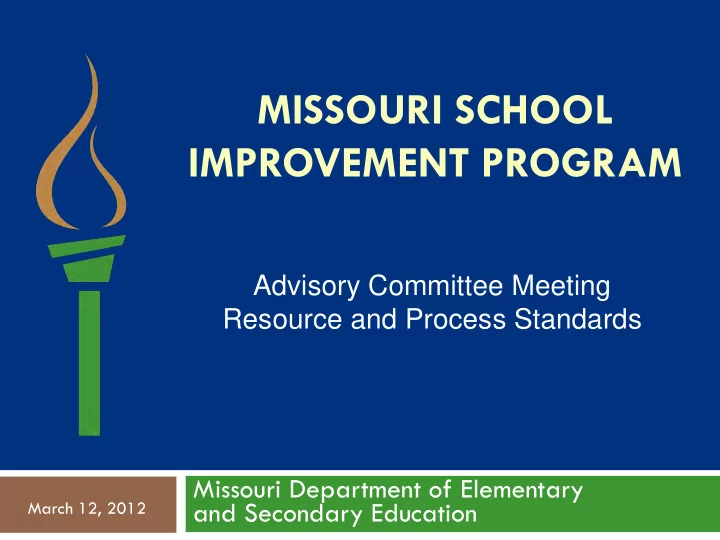

MISSOURI SCHOOL IMPROVEMENT PROGRAM Advisory Committee Meeting Resource and Process Standards Missouri Department of Elementary and Secondary Education March 12, 2012
Why we’re here!
MSIP 5 Policy Goals Promote continuous improvement and innovation within each district on a statewide basis to advance the opportunity for success for each student. Establish the state’s expectations for districts in driving actions for moving student achievement to Top Ten status with the ultimate goal of all students graduating ready for success in college and careers. Distinguish performance of schools and districts in valid, accurate, and meaningful ways so that districts in need of improvement can receive appropriate support and interventions to meet expectations and her performing districts can be recognized as models of excellence . Empower all stakeholders through regular communication and transparent reporting of clear data on performance and results so that they can take action appropriate to their roles.
Research “ If we follow the research, we can enter an era of unprecedented effectiveness for schools – one in which the vast majority of schools can be highly effective in promoting student achievement.” Robert Marzano
What do we need to do? Creating the “effective schools process” requires educators… to use the best available research to create a plan of action that would have a chance of success.
MSIP and the Show-Me Standards All Missouri content standards are related back to the Show-Me Standards by state statute. 2 nd Cycle of MSIP 3rd Cycle of MSIP 4 th Cycle of MSIP 5 th Cycle of MSIP • MMAT Core Competencies • Curriculum Frameworks for • GLEs/CLEs developed over • GLEs and CLEs for many and Key Skills most content areas and time for most content areas content areas. competencies for Career • Transitioned to Show-Me • Moved from Curriculum • Transition current Education Standards as reflected as Frameworks over time to communication arts and the Curriculum Frameworks. • Grade-Span Assessments GLEs. mathematics GLEs and CLEs to Common Core • Transition from the MMAT • Developed CLEs from GLEs based grade-level and to the Missouri Assessment and course models course content Program’s Grade -Span • Include Career Education Assessments • Career Education competencies competencies • Grade – Level assessments • Grade-Level assessments, and End-of-Course End-of-Course assessments, assessments introduced and the introduction of an • Model curriculum units for End-of-High School mathematics and College/Career-Ready communication arts. Assessment • Model curriculum form all content areas.
Top 10 by 20 Goals and Objectives GOAL 1: All Missouri students will graduate college and career ready. OBJECTIVE 1: The percentage of students: A. Scoring at or above proficient level on National Assessment of Educational Progress (NAEP) will increase by 1 percentage point at each test administration. B. Scoring at or above proficient level on state assessments will increase each year to exceed 75% of students in all subgroups by 2020. C. Scoring at or above the mean of the top 10 states on college and career ready assessments (e.g. ACT, SAT, COMPASS, ASVAB, TSA) will increase annually. OBJECTIVE 2: By 2020, all students will qualify for entrance into post secondary education/training. http://dese.mo.gov/top10by20/goals.html
Missouri Model Teacher and Leader Standards A Resource for State Dialogue A Resource for State Dialogue Adopted and approved by the Missouri State Board of Education: June 2011 http://dese.mo.gov/eq/documents/StandardsInformationDocument.pdf
Missouri Educator Evaluation System A deliberate and intentional process to use evaluation to Provide accurate, reliable assessment of current status Increase competency through focused feedback and learning Verify higher level of teacher effectiveness Confirm an increase in student achievement 9
Getting it right: Two Key Principles An effective evaluation system: Must be systemic and address improvement of professional practice at all levels Must be precise enough to ensure that improvement occurs while being simple enough that it is manageable and workable 10
5 Effectiveness Indicators Observations Train and certify evaluators Use multiple observations to increase reliability Periodic reliability check with impartial observers Student achievement gains Use of informal student performance measures to guide formative development Use of state assessment data verifies accuracy of the system Feedback on performance Include the voice of the recipient Surveys to students, teachers, principals, board members, community, etc. Applied professional learning Applied learning should address targeted areas of growth Quality of the Unit of Instruction/Improvement Plans Evidence of organization, presentation, and appropriate objectives 11
Essential Components of Effective Evaluation Systems Is aligned to research-based performance targets Includes a minimum of 3 performance levels (ideally 4 or maybe 5) Highlights the importance of probationary period Includes multiple observations/evaluations and deliberate feedback Uses student performance measures and evidence of student learning As a “preponderant” criterion, it “significantly” informs evaluation Provides ongoing, regular, timely and meaningful feedback for all Theory of Action: Everyone at every level grows every year Includes ongoing training for evaluators to ensure rating reliability Use results/data to inform personnel decisions, determinations and policy Identifies who is in need of targeted interventions (includes timeframes) Identifies who has earned recognition, tenure and/or compensation 12
Outcomes for Expert Groups To what extent should the MSIP process prompt districts and schools to utilize effective schools research as a part of their school improvement efforts? Meet with Small Group of Experts Implications of the research Determine what research is still needed. Report out
Expert Groups Librarians Counselors Principals (In room 460) Central Office (e.g. Superintendents, Assistant Superintendents) (In room 470) Teachers/CTE Parents/PTA Gifted Special Education PE/Health Fine Arts
Expert Small Group Activity
Small Group/Working Lunch Process Standards Activity Continued from the last meeting Report Out
Meeting Monday, April 2
Recommend
More recommend